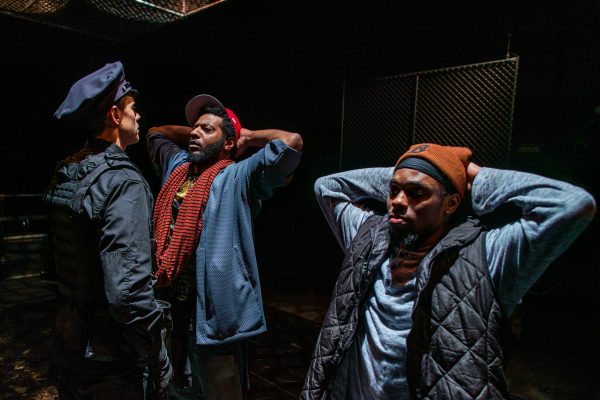Theater Review: “Pass Over” — An Unforgiving World
By Robert Israel
If one of the aims of art is to create a distinctively imaginative world, than Pass Over succeeds in generating a landscape of devastation, a hopeless place filled with gaping wounds and visible scars.
Pass Over by Antoinette Nwandu. Directed by Monica White Ndounou. A co-production of the Front Porch Arts Collective and SpeakEasy Stage Company at the Stanford Calderwood Pavilion at the Boston Center for the Arts, 527 Tremont St. Boston, MA, through February 2.

Lewis D. Wheeler, Kadahj Bennett, and Hubens “Bobby” Cius in the SpeakEasy Stage production of Pass Over. Photo: Nile Scott Studios.
Be forewarned — you may be physically accosted as you make your way to your seat at the Calderwood Pavilion. Audience members sit on four sides of the open performance space: a bare stage with plywood platforms, a lamppost, and a steel column that could be identified as a whipping post. This one-act play begins as soon as the actors enter and begin warming up. They get into the rhythm of the evening in a peculiar fashion (arms flailing and akimbo, torsos writhing, the duo appear to be playing a silly game with their bare palms). They seem to be in a mischievous mood and, because we must thread across their turf to sit down, the twosome will get in your face. That’s a guarantee. But when you finally get to your seat, don’t delude yourself into believing you’re home free. Wait until the lights dim. This play takes no prisoners. Even in its quiet moments – and there are a few – it’s like venturing to survey the wreckage with the arrival of the eye of a storm. The calm will only last a moment — the maelstrom will return.
Playwright Antoinette Nwandu tells us that Pass Over is set “now/right now/but also 1855/but also 13th century BCE.” She says that the location is: “a ghetto street, a lamppost/night/but also a plantation/but also Egypt, a city built by slaves.” That is another way of saying she takes a long historical look at racism in America. No wonder that director Spike Lee – never known for being subtle — has released a film adaptation of Pass Over. Nwandu’s long view, compacted into 90 minutes, hammers its blunt message home via a policeman’s truncheon that hits viewers upside the head.
Like African American playwright Branden Jacobs-Jenkins, whose script Appropriate was memorably produced by SpeakEasy Stage Company five years ago, Nwandu “appropriates” themes from other dramatists. Her description of the setting is reminiscent of Samuel Beckett’s sparse vision for Waiting for Godot – “A country road. A tree.” And the structure of her play – a story about two men waiting to “pass over” into the promised land that eludes them – mirrors the plot of Beckett’s absurdist yarn about two men waiting for deliverance from their squalid paralysis by a mysterious character named Godot who has promised to come for them (but never does).
In Pass Over, Moses (Kadahj Bennett) and Kitsch (Hubens “Bobby” Cius) are homeless and searching for a way out, a path beyond. (The third and fourth characters, Mister and Ossifer, are both played by Lewis D. Wheeler). There are Biblical references throughout as the two men reminiscence about religious classes they took and the promises they heard: one day they will be rewarded with the succor of “milk and honey” that lies just beyond, when they will be freed from the muddied life they are living. But we realize, well before they do, that this is just another one of those pipe dreams told to the permanently mired. Like Beckett’s two forlorn hobos, no one is going anywhere.
The reason this production is so effective, to the point of being mesmerizing, is because of the marvelously energetic performances of Bennett and Cius, who riff off one another in amazing ways. Watch them strut their stuff. Observe their faces as they pout, and laugh, take turns mocking one another, embrace, as they reach out into dark space as if grasping for a life raft that isn’t there and never will be. It’s as if they’re listening to non-audible music (at least to us), high pitched and far off. They move to it, sway to it, surrender to it. And we watch in wonder. It’s a creative urban choreography that almost carries them away from their squalor into a kinder place where they can eat a full meal instead of gnawing on fetid crusts of bread. Wheeler’s squareness is the perfect foil for the pair’s desperately playful rhythms — he succeeds admirably as a white man in a tight suit, carrying a picnic basket with store-bought slices of pie. Beckett’s characters fight over chicken bones; Nwandu’s squabble over collard greens. High praise should also go to Anna Drummond for her sound design, which is perfectly in sync with Kathy A. Perkins’s powerful lighting.
If one of the aims of art is to create a distinctively imaginative world, than Pass Over succeeds in generating a landscape of devastation, a hopeless place filled with gaping wounds and visible scars. Better yet, this is a world that aims its unforgiving boot where we comfortably sit.
Robert Israel writes about theater, travel, and the arts, and is a member of Independent Reviewers of New England (IRNE). He can be reached at risrael_97@yahoo.com.
Tagged: Antoinette Nwandu, Monica White Ndounou, Pass Over, Robert Israel
